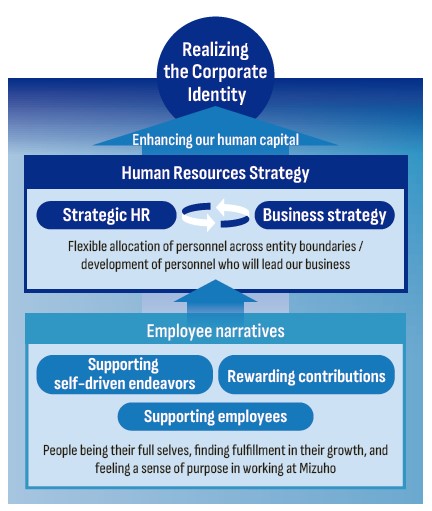About CANADE
Mizuho publishes the "Human Capital Report" to comprehensively explain how we will create value together with our customers, the economy and society through "Enhancing Human Capital" and "Transforming Corporate Culture". For details on our various human capital initiatives.
Further information
Human Capital Report
Breaking away from traditional HR management
At Mizuho, we regard human capital as the source of value creation, and CANADE is the foundation for the continuous enhancement and enrichment of our personnel. CANADE, which was created in partnership with employees, is a shared HR framework across five group companies and it encompasses two aspects: a commitment to strategic HR and an emphasis on employee narratives.
The first aspect — strategic HR — involves the alignment of business strategies with HR strategies. Specifically, it involves enabling individual business divisions to take the lead in their HR management as well as promoting strategic talent acquisition and development across business areas.
The second aspect — employee narratives — is the cornerstone of achieving strategic HR. It involves initiatives that encourage our employees to take greater initiative in designing their own individual careers and to direct their growth.
We believe that engaging in human capital management, guided by this CANADE framework, will connect the growth of individuals with business advancement, enhance Mizuho's capability to create value, and ultimately lead to the realization of our corporate identity.
Breaking away from traditional HR management
CANADE introduces new systems and operations that break with traditional practices such as seniority-based HR management and company-led HR operations. As we have just completed the transition to CANADE, efforts are still ongoing to disseminate the idea of breaking with the previous seniority system, to instill role-based and performance-based compensation, and to encourage employee independence through the presentation and provision of career paths. The aim, as we take steps to improve in these areas, is to enable all employees to maximize their potential through CANADE and to create a virtuous cycle between the growth of individual employees and increased corporate value.

Mizuho's perspectives on changes brought on by the transition to CANADE

Employees perspectives on changes brought on by the transition to CANADE
